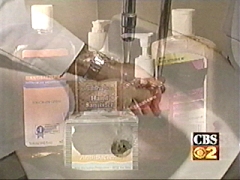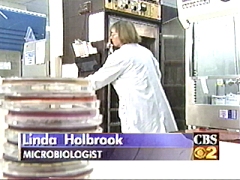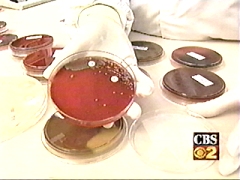 |
 |
 |
 |
| |
||||
Body CreaturesA CBS 2 News Special Assignment  They live in your eyelashes. Sometimes they hide in your hair or burrow in your skin. Most of the time you can't see or feel them, but they are there. They live in your eyelashes. Sometimes they hide in your hair or burrow in your skin. Most of the time you can't see or feel them, but they are there. They're microscopic mites that live on most everyone's hair folicles. But if you're washing with antibacterial soaps or taking antibiotics to prevent the cold or flu, you might be doing yourself more harm than good. CBS 2 News' Thelma Gutierrez explains how you could be killing some of the body creatures you actually want to keep. Special Assignment: Body Creatures aired Tuesday, January 19, 1999 at 11 p.m. But in fact, they are not our enemies, but our allies. "We are set up in the world to live with bacteria and get along with them," Microbiologist Linda Holbrook at Northridge Hospital told CBS 2 News. Consider yourself a mini-ecosystem where different organisms thrive and grow, said CBS 2 News' Thelma Gutierrez. They depend on us to live. But what happens when we change and alter their environment? "There's always a risk once you use antibacterial agents for a prolonged period of time," pediatrician Dr. Pejman Salimpour told Gutierrez. "You increase the chances for a resistant organism to live on your skin." Salimpour says the soaps can kill the good organisms that live on our skin and make the bad ones more resistant. He said old-fashioned soap and water are enough to get you clean. "Just like the environment is an ecosystem, our bodies are also. Many of these germs live with us a peaceful life," Salimpour said. "We don't have to get rid of every single one of them. We can just live together. It's just the harmful ones we have to get rid of." "Our bodies has a lot of mechanics for itself and we don't need to be completely clean and sterile. We weren't designed that way," Holbrook said. Holbrook believes we're putting ourselves in serious jeopardy. When doctors over prescribe and we over consume antibiotics, we're hampering the body's ability to defend itself. According to Holbrook, new germs are evolving that antibiotics can't kill. "The bacteria mutates and adapts to this, and they become more resistant," Holbrook explained. "And the things that used to work against them do not work against them anymore." There's bacteria that is normal in your throat. Too many strong antibiotics can kill the good bacteria and let the bad take over, said Gutierrez. "It's sort of like a war. We have a weapon to use against this bacteria, and the bacteria is developing its own response to that weapons, so now it will not be effective against it," said Holbrook. "We have to develop new weapons." Scientists worry we could lose the battle against dangerous enemies we have unintentionally helped to create. Experts said germs that cause sinus, ear and blood infections, pneumonia and some meningitis are resistant to multiple antibiotics. They also said more than 50 million antibiotic prescriptions given out every year are unnecessary.
|
||||||||||

|
||||||||||
|
Retire Rich
 |

 |
||
|
12 p.m.
Woman 2 Woman One of the stars from "Judging Amy" 5 p.m. 6 p.m. 11 p.m.
|
||
 |
||
|
4-5 p.m.
Judge Judy Ruler Of The Free World! 8:00 p.m. 8:30 p.m.
9:00 p.m.
|
||
| |
||
 They look like prehistoric creatures. Adversaries ready for battle.
They look like prehistoric creatures. Adversaries ready for battle.  Some experts say that's what happens when we use antibacterial soaps and germ killers when we do something simple like wash our hands.
Some experts say that's what happens when we use antibacterial soaps and germ killers when we do something simple like wash our hands.  But, he said, old fashioned soap and water do the trick. We're not only putting ourselves at risk by changing the environment on the outside of our bodies, but also on the inside, said Gutierrez.
But, he said, old fashioned soap and water do the trick. We're not only putting ourselves at risk by changing the environment on the outside of our bodies, but also on the inside, said Gutierrez.  In the case of viral infections that cause a cold or flu, antibiotics don't work at all. Still, we still take them.
In the case of viral infections that cause a cold or flu, antibiotics don't work at all. Still, we still take them. 

